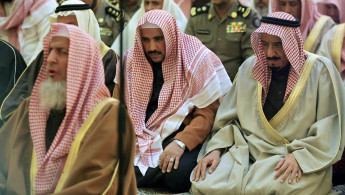Iranians are 'not Muslims' says Saudi top cleric
Saudi Arabia's top cleric said Iranians are "not Muslims", after Iran's supreme leader launched a fresh tirade over the kingdom's handling of the hajj pilgrimage.
"We must understand these are not Muslims, they are children of Magi and their hostility towards Muslims is an old one. Especially with the people of Sunna," Grand Mufti Abdulaziz al-Sheikh told Makkah daily, referring to pre-Islamic beliefs in Iran and to the Sunnis who make up the main branch of Islam.
The grand mufti's comments came a day after Iran's Ayatollah Ali Khamenei said the Muslim world should challenge Saudi management of Islam's two holiest sites in Mecca and Medina.
The verbal sparring, ahead of the annual hajj which this year starts on Saturday, follows months of tension between Sunni-dominated Saudi Arabia and its regional rival Iran.
"Because of Saudi rulers' oppressive behaviour towards God's guests, the world of Islam must fundamentally reconsider the management of the two holy places and the issue of hajj," Khamenei wrote on his website.
He reserved some of his harshest words for Riyadh's response to last year's hajj stampede which killed 2,297 pilgrims, according to a toll compiled from foreign officials.
Iran said its nationals accounted for 464 of the dead.
Khamenei said the Saudis did not prosecute those at fault for the stampede, accused them of showing no remorse and said Riyadh had "refused to allow an international Islamic fact-finding committee".
After reviewing security forces assigned to protect the hajj, Saudi Crown Prince Mohammed bin Nayef said later Monday that the kingdom had "spared no effort to provide state-of-the-art services for the safety, comfort and security of all pilgrims".
For the first time in almost three decades, Iranians will not participate in this year's pilgrimage to Mecca after talks on logistics and security fell apart.
Riyadh said Tehran had made "unacceptable" demands, including the right to organise demonstrations "that would cause chaos".
Prince Mohammed reiterated those concerns.
He charged that Iran was making "efforts to politicise hajj and convert it into an occasion to violate the teachings of Islam, through shouting slogans and disturbing the security of pilgrims".
Sheikh said such efforts would fail "because all Muslims trust what the (Saudi) government is doing" in providing services for pilgrims and with its work to improve facilities at the holy sites.
Saudi Arabia says Iranian pilgrims are still welcome if they travel from other countries.
Riyadh and Tehran are at odds over a raft of regional issues, notably the conflicts in Syria and Yemen in which they support opposing sides.
Riyadh severed diplomatic relations with Tehran in January after protesters attacked its embassy and a consulate in Iran after the execution of a prominent Shia cleric in Saudi Arabia.





 Follow the Middle East's top stories in English at The New Arab on Google News
Follow the Middle East's top stories in English at The New Arab on Google News
![The UAE is widely suspected of arming the RSF militia [Getty]](/sites/default/files/styles/image_330x185/public/2024-11/GettyImages-472529908.jpg?h=69f2b9d0&itok=Yauw3YTG)
![Netanyahu furiously denounced the ICC [Getty]](/sites/default/files/styles/image_330x185/public/2024-11/GettyImages-2169352575.jpg?h=199d8c1f&itok=-vRiruf5)
![Both Hamas and the Palestinian Authority welcomed the ICC arrest warrants [Getty]](/sites/default/files/styles/image_330x185/public/2024-11/GettyImages-2178351173.jpg?h=199d8c1f&itok=TV858iVg)